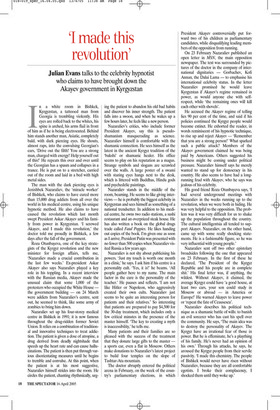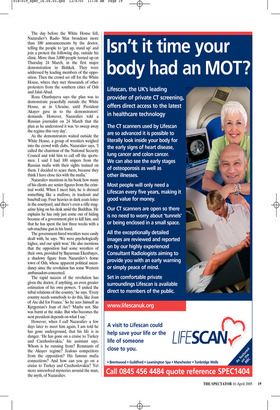‘I made this revolution’
Julian Evans talks to the celebrity hypnotist who claims to have brought down the Akayev government in Kyrgyzstan Ina white room in Bishkek, Kyrgyzstan, a tattooed man from Georgia is trembling violently. His eyes are rolled back to the whites, his spine is arched, his arms flail in front of him as if he is being electrocuted. Behind him stands another man, Asiatic, completely bald, with dark piercing eyes. He shouts, almost raps, into the convulsing Georgian’s ears, ‘Drive out the filth! You are a strong man, charged with energy! Help yourself out of this!’ He repeats this over and over until the Georgian has a spasm and collapses in a trance. He is put on to a stretcher, carried out of the room and laid in a bed with high metal sides.
The man with the dark piercing eyes is Jenishbek Nazaraliev, the ‘miracle worker’ of Bishkek, who claims to have cured more than 15,000 drug addicts from all over the world in his medical centre, using his unique hypnotic method. He also claims to have caused the revolution which last month swept President Askar Akayev and his family from power in Kyrgyzstan. ‘I screwed Akayev, and I made this revolution,’ the doctor told me proudly in Bishkek, a few days after the fall of the government.
Roza Otunbayeva, one of the key strategists of the Kyrgyz revolution and the new minister for foreign affairs, tells me, ‘Nazaraliev made a crucial contribution in the last few weeks.’ Ex-president Askar Akayev also says Nazaraliev played a key role in his toppling. In a recent interview with the Russian media, Akayev made the unusual claim that some 1,000 of the protesters who occupied the White House the government building — on 24 March were addicts from Nazaraliev’s centre, sent out, he seemed to think, like some army of zombies to bring him down.
Nazaraliev set up his four-storey medical centre in Bishkek in 1991; it is now famous throughout the drug-ridden former Soviet Union. It relies on a combination of traditional and innovative techniques to treat addiction. The patient is given a dose of atropine, a drug derived from deadly nightshade that speeds up the heart rate and can cause hallucinations. The patient is then put through various disorientating measures until he begins to tremble and convulse. At this point, when the patient is at his most suggestive, Nazaraliev himself strides into the room. He circles the patient, chanting rhythmically, urg ing the patient to abandon his old bad habits and discover his inner strength. The patient falls into a swoon, and when he wakes up a few hours later, he feels like a new person.
Nazaraliev’s critics, who include former President Akayev, say this is pseudoshamanism masquerading as science. Nazaraliev himself is comfortable with the shamanic connection. He sees himself as the latest in the ancient Kyrgyz tradition of the ‘bakshi’ or shamanic healer. His office seems to play on his reputation as a magus. Strange symbols and slogans are scrawled over the walls. A large poster of a swami with staring eyes hangs next to the desk, which is littered with Buddhas, Hindu gods and psychedelic paintings.
Nazaraliev stands in the middle of the room, beaming. He seems to like giving interviews — he is probably the biggest celebrity in Kyrgyzstan and sees himself as something of a national trendsetter. In addition to his medical centre, he owns two radio stations, a sushi restaurant and an overpriced steak house. He has also written a book on the global drugs trade called Fatal Poppies. He likes handing out copies of the book. I’m given one as soon as I arrive; President Putin was presented with no fewer than 500 copies when Nazaraliev visited Russia a few years ago.
Nazaraliev is not shy about publicising his powers. ‘Just my touch is worth one month in a clinic,’ he says. I ask him if his centre is a personality cult. ‘Yes, it is!’ he beams. ‘All people gather here to my name. The main factor in the cure is the personality of the teacher.’ He pauses and reflects. ‘I am not like Hitler or Napoleon, who aggressively created their own cults. Nazaraliev just seems to be quite an interesting person for patients and their relatives.’ So interesting that patients are prepared to pay $4,500 for the 30-day treatment, which includes only a few critical minutes in the presence of the master himself. ‘The key to creating a myth is inaccessibility,’ he tells me.
Many patients and their families are so pleased with the success of the treatment that they donate large gifts to the master a sports car, even a flat in Moscow. Others make donations to Nazaraliev’s latest project to build four temples on the slope of Tashtar-Ata mountain.
The doctor abruptly entered the political arena in February, on the week of the country’s parliamentary elections, in which President Akayev controversially put forward two of his children as parliamentary candidates, while disqualifying leading members of the opposition from running.
On 23 February Nazaraliev published an open letter in MSN, the main opposition newspaper. The text was surrounded by pictures of the doctor in the company of international dignitaries — Gorbachev, Kofi Annan, the Dalai Lama — to emphasise his international celebrity status. In the letter Nazaraliev promised he would leave Kyrgyzstan if Akayev’s regime remained in power, as would anyone else with selfrespect, while ‘the remaining ones will kill each other with shovels’.
He accused the Akayev regime of telling lies 90 per cent of the time, and said if his policies continued the Kyrgyz people would become extinct. He exhorted the reader, in words reminiscent of his hypnotic technique, to rise up and reject Akayev — ‘Remember that you are a strong person!’ What sparked such a public attack? Members of the Akayev government claimed he was being paid by Americans. Others suggested his business might be coming under political pressure. Nazaraliev himself says he merely wanted to stand up for democracy in his country. He also seems to have had a longrunning feud with Akayev, who he says was jealous of his celebrity.
His good friend Roza Otunbayeva says, ‘I had several underground meetings with Nazaraliev in the weeks running up to the revolution, when we were both in hiding. He was very helpful to the opposition. The problem was it was very difficult for us to shake up the population throughout the country. The cultural intelligentsia all tended to support Akayev. Nazaraliev, on the other hand, came up with some really shocking statements. He is a fashionable figure, so he was very influential with young people.’ Nazaraliev sent off two other epistolary broadsides following the one that appeared on 23 February. In the first of these he declared, ‘The President of the Kyrgyz Republic and his people are in complete shit.’ His final letter was, if anything, the wildest. Without Akayev, it claimed, the average Kyrgyz could have ‘a good house, at least two cars, your son could study in Moscow or abroad — in America or Europe!’ He warned Akayev to leave power or ‘repeat the fate of Ceausescu’.
Nazaraliev describes his political technique as a shamanic battle of wills: to banish an evil sorcerer who has cast his spell over the community. He says, ‘The main idea was to destroy the personality of Akayev. The Kyrgyz have an irrational fear of those in power. But he is effeminate, he’s a plaything of his family. He’s never had an opinion of his own.’ Through his attacks, he says, he aroused the Kyrgyz people from their servile passivity. ‘I made this chemistry. The people of Bishkek would never have risen without Nazaraliev, because they are all comfortable egotists. I broke their complacency, I shocked them until they woke up.’ The day before the White House fell, Nazaraliev’s Radio Max broadcast more than 100 announcements by the doctor, telling the people to ‘get up, stand up’ and join a protest the following day, outside his clinic. More than 3,000 people turned up on Thursday 24 March, in the first major demonstration in Bishkek. They were addressed by leading members of the opposition. Then the crowd set off for the White House, where they met thousands of other protesters from the southern cities of Osh and Jalal-Abad.
Roza Otunbayeva says the plan was to demonstrate peacefully outside the White House, as in Ukraine, until President Akayev gave in to the demonstrators’ demands. However, Nazaraliev told a Russian journalist on 24 March that the plan as he understood it was ‘to sweep away the regime this very day’.
As the demonstrators waited outside the White House, a group of wrestlers weighed into the crowd with clubs. Nazaraliev says, ‘I called the chairman of the National Security Council and told him to call off the sportsmen. I said I had 100 snipers from the Russian mafia with their sights trained on them. I decided to scare them, because they think I have close ties with the mafia.’ Nazaraliev mentions in his book how many of his clients are senior figures from the criminal world. When I meet him, he is dressed something like a mafioso, in tracksuit and baseball cap. Four heavies in dark coats loiter in the courtyard, and there’s even a rifle magazine lying on his desk amid the Buddhas. He explains he has only just come out of hiding because of a government plot to kill him, and that he has spent the last three weeks with a sub-machine gun in his hand.
The government-hired wrestlers were easily dealt with, he says. ‘We were psychologically higher, and our spirit won.’ He also mentions that the opposition had some wrestlers of their own, provided by Bayarman Ekenbayev, a shadowy figure from Nazaraliev’s home town of Osh, whose apparent political ascendancy since the revolution has some Western ambassadors concerned.
The rapid success of the revolution has given the doctor, if anything, an even greater estimation of his own powers. ‘I united the tribal relations of the country,’ he says. ‘Every country needs somebody to do this, like Joan of Arc did for France.’ So he sees himself as Kyrgyzstan’s Joan of Arc? ‘Maybe not. She was burnt at the stake. But who becomes the next president depends on what I say.’ However, when I call Nazaraliev a few days later to meet him again, I am told he has gone underground, that his life is in danger. ‘He has gone on a cruise to Turkey and Czechoslovakia,’ his assistant says. Whom is he running from? Remnants of the Akayev regime? Jealous competitors from the opposition? His famous mafia connections? And how can you go on a cruise to Turkey and Czechoslovakia? Yet more unresolved mysteries around the man, the myth, of Nazaraliev.

























































 Previous page
Previous page